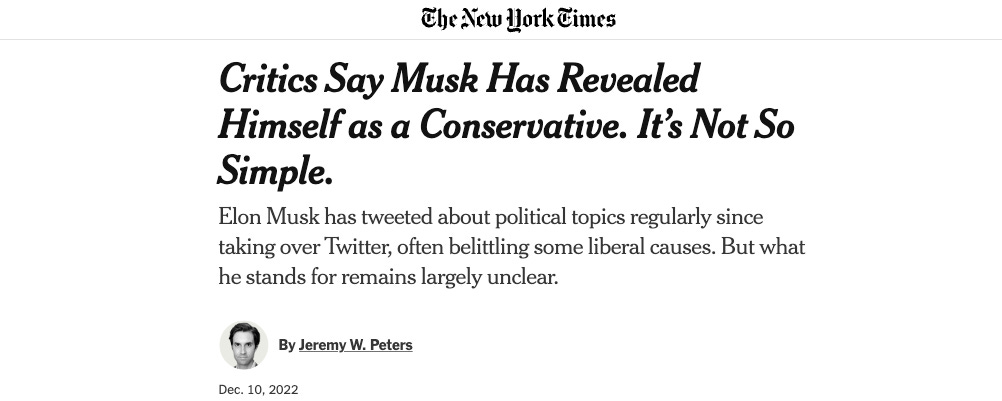It's Been a Year Since NYT Published a Notoriously Bad Article. It's More False Than Ever.
“Critics Say Musk Has Revealed Himself as a Conservative. It’s Not So Simple." Except it is.
On the anniversary of Jeremy Peters’ New York Times article about why “it’s not so simple” to say that Elon Musk “has revealed himself as a conservative,”1 the reactionary billionaire participated in an extremely friendly Twitter X Spaces chat with right-wing conspiracy theorist Alex Jones, alleged human trafficker Andrew Tate, Republican presidential candidate Vivek Ramaswamy, QAnon conspiracy theorist and former Trump National Security Advisor Mike Flynn, and Venmo enthusiast/Republican congressman Matt Gaetz.
The Present Age is made possible by paid subscribers. If you aren’t one already, please consider signing up here:
If you’re not aware of that article, I wrote a fairly thorough piece after it came out explaining why Peters’ conclusion was transparently false while also asking why the Times would go to such lengths to obfuscate reality.
The New York Times Doesn't Want to Understand Elon Musk's Politics
On Saturday, the disaster that has become The New York Times published a piece by Jeremy Peters titled, “Critics Say Musk Has Revealed Himself as a Conservative. It’s Not So Simple.” *sigh*
On the off chance that Peters simply hadn’t seen the evidence of Musk’s political leanings, my piece went through some of the obvious points, including Musk’s recent political giving, his call for voters to elect Republicans, Gov. Greg Abbott (R-TX) saying that he “frequently” talks to Musk and Musk “likes the social policies in the state of Texas,” Musk’s fiery hatred for trans people, and more.
The argument made by Peters in the piece was that Musk’s endorsement of Republicans was “not especially resounding,” a claim that Musk “is more clear about what he is against than what he is for,” and that Musk had once identified his politics as “middle-of-the-road” (which can mean anything — few people openly identify themselves as extremists). It wasn’t particularly compelling, to say the least.
I think my whole article from last year is worth checking out, but this part, especially:
Peters’ article explains exactly why Musk fits in with the far-right, but then goes out of its way to act as though Musk is some mystery. This is the type of playacting I hate to see in political journalism and punditry. You’d see it happen all the time during the Trump administration: Trump would deliver a speech from a teleprompter, clearly reading it for the very first time live, and get a bunch of praise from the pundit class for “pivoting.” Meanwhile, average everyday people see through this. The same is true for Musk. If Jeremy Peters wants to pretend that Musk has indecipherable politics, he’s free to do that. He should know, however, that it makes him look like an out of touch fool. If the press wants to regain the trust of the public, the people working within the system need to understand that this sort of Birdbox-like blindfoldedness only makes the problems worse.
Months after the story, I followed up with Peters, with disappointing results.
I emailed Peters on August 21, November 20, and November 28 of this year. I didn’t have high hopes for a response (if there’s one thing Times journalists aren’t exactly known for, it’s admitting mistakes or changes of heart), but I figured I’d at least get a standard “we stand by our reporting” type of reply from the Times.
Specifically, the questions I’d hoped to get answers to:
Has your assessment of Musk’s politics changed since December 2022?
If so, how would you describe his politics now?
What, if anything, changed your mind?
After the first email went unanswered, I followed up twice more in November, repeating the same questions, again not getting an answer.
No response. Oh well. There used to be a time when the Times actually employed a public editor, someone who could get to the bottom of these questions and whose job was to help readers understand the paper’s editorial decisions. But then they got rid of it in 2017. At the time, publisher Arthur Sulzberger Jr. explained to staff that “Today, our followers on social media and our readers across the Internet have come together to collectively serve as a modern watchdog, more vigilant and forceful than any one person could ever be. Our responsibility is to empower all of those watchdogs, and to listen to them, rather than to channel their voice through a single office.”
Unfortunately, Times reporters are notorious for not paying attention to what people are saying on social media. And when they do acknowledge criticism, it tends to be in a very condescending way that treats critics as fools who just don’t understand how journalism works.
In April 2022, then-Times executive editor Dean Baquet argued that social media, specifically responses posted to Twitter, had too much influence on how journalists covered topics.
The truth is that the Times seems to reject the premise that it should be held accountable to anyone. The responses tend to be some variation on complete and total silence or a hearty “How dare you question us?”
That was basically the response from the Times when a bunch of journalists who had at one point written for the paper criticized its fanatical coverage of transgender issues. The Times published thousands of words scaremongering about whether or not puberty blockers (drugs that his pause on a body’s natural puberty, used to buy extra time for trans teens and their parents before undergoing any more permanent changes and ensuring that they were making the right choices for themselves) caused lifelong skeletal damage. The premise was weak, and the article interviewed people who wanted to make transition-related care outright illegal (as opposed to simply being concerned about bone health). As it turns out, the claims and concerns expressed in the story were false.
It’s thanks in part to the paper’s absurd anti-trans coverage that the 2024 presidential campaign is already shaping up to be a referendum on whether or not trans people deserve to live. Journalists shape public perception. News organizations help set political agendas. It shouldn’t be too much to ask that they thoughtfully engage with questions and criticism instead of acting like they’re above it all.
That’s it for me today. Again, thanks for reading. As I gear up for 2024, the costs of running TPA will be a bit higher. If you enjoy this newsletter and want to help me keep it up and running, please consider purchasing a paid subscription. If just 10% of free subscribers upgrade to paid, I will be able to invest in posts from freelancers, editors, artwork, etc.
Parker
Some people will argue that Musk isn’t a conservative, he’s just on the right. But in describing American politics, the words “conservative” and “liberal” are used more or less synonymously with “Republican” and “Democrat.”











On one hand, the New York Times can put out some of the best journalism in the country. And on the other, it's affirmative action for mediocre white conservatives.
Venmo enthusiast. LOL